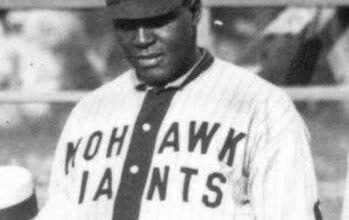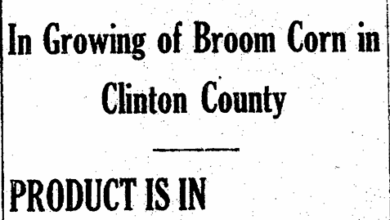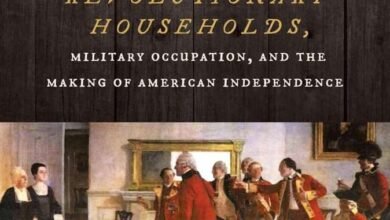The Extraordinary Life of Jehudi Ashmun (1794–1828)


 Researching and sharing the stories of remarkable people is rewarding with the recognition that it often takes a book to be truthful and fair to the many interesting journeys their lives took. Such a remarkable person is Jehudi Ashman, a Clinton County, NY man instrumental in the development of the African nation of Liberia.
Researching and sharing the stories of remarkable people is rewarding with the recognition that it often takes a book to be truthful and fair to the many interesting journeys their lives took. Such a remarkable person is Jehudi Ashman, a Clinton County, NY man instrumental in the development of the African nation of Liberia.
Jehudi Ashmun was born and raised in Champlain, the second son and third child in a family of ten. His father Samuel was a Revolutionary War veteran, one of Champlain’s founding fathers and an abolitionist. His brother Orson Branch Ashmun, also an abolitionist, published the first newspaper in Champlain, the Herald Freeman.
Jehudi was initially educated in Champlain. The first change to his life took place at age 13, with the arrival of Congregational Minister Rev. Amos Pettengill in 1807.
After finishing his studies at Harvard, Rev. Pettengill was installed in his first post holding the first religious service of its kind recorded in Champlain. Rev Pettengill is credited with providing Jehudi a more focused education although Pettengill’s biographer Rev. Luther Hart describes it more like a rescue:
“That good man was once a wayward youth, but through Pettengill’s work, laboring long and taking much pains, he was at last blest in getting Jehudi off his errors as he had long been inclined the wrong way on the subject of religion. Jehudi became pious and fitting for college under the instruction of Pettengill.”

 Under Pettengill’s influence, Jehudi joined the Congregational Church at age 16. In 1812, at age 18, he was admitted to Middlebury College in Vermont, a training ground for the ministry with a very classical course of study. While a student, Jehudi became ill, the first of his recorded challenges attributed to the “intensity of his character.”
Under Pettengill’s influence, Jehudi joined the Congregational Church at age 16. In 1812, at age 18, he was admitted to Middlebury College in Vermont, a training ground for the ministry with a very classical course of study. While a student, Jehudi became ill, the first of his recorded challenges attributed to the “intensity of his character.”
For one semester he returned to Champlain, then returned to Middlebury in 1815 and shortly after left for Vermont University in Burlington, where he graduated in 1816.
After university, Jehudi’s became the first principal of the Bangor Theological Seminary in Bangor, Maine, originally known as the Maine Charity School. In 1816, as the first principal and only instructor, Jehudi took charge of six students.
A book on the history of the Seminary described him as “a man of more than common intellectual ability… he was of a profoundly religious nature, and it was his deeply cherished purpose to become a missionary to the heathen.”
Jehudi’s biographer Ralph Gurley noted that Jehudi also helped the Trustees of the Maine Charity School with a plan of government, and suggested a course of studies that would appeal to the Christian community. He is credited with bringing the seminary to public notice.
But there were complications. While in Middlebury Jehudi had established a relationship with Catherine Gray whose focus was on mission work and who was not interested in moving with him to Maine. He met another woman while in Maine, but that relationship ended when Catherine found out and agreed to marry Jehudi in October 1818.
Meanwhile the students, the town and the district were upset by Jehudi’s marriage to Catherine and his rejection of the local girl. The students rebelled and would not attend his classes. The School Trustees found the students to be in the wrong but acknowledged that the situation was “intolerable to a person of Professor
Ashmun’s high-strung and sensitive nature.”

 In 1819, he left Maine and moved to Washington, DC, where he connected with the Protestant Episcopal Church and published their Washington Theological Repertory, a monthly publication from August 1819 to July 1822.
In 1819, he left Maine and moved to Washington, DC, where he connected with the Protestant Episcopal Church and published their Washington Theological Repertory, a monthly publication from August 1819 to July 1822.
Its purpose was the promotion of religion, humanity and literature within 32 pages of religious direction, scholarship, history and reports on local and missionary activities, including regular reports of the activities of the American Colonization Society, which was encouraging African Americans to return to Africa .
Additionally, in 1820, Jehudi published one edition of the African Intelligencer, a journal with articles on the slave trade, African geography, the expedition of the Elizabeth (the ship that carried the first group of colonists to Liberia), and the American Colonization Society constitution.
The American Colonization Society, upset by the expense and the lack of public support, canceled the journal after one issue.
Then in 1821, Jehudi published the Memoir of the Life and Character of Reverend Samuel Bacon. Bacon was a minister of the Episcopal Church and was one of the first to look for alternative locations for the free black population and those freed from the captured slave ships.
Later Bacon was named as the government’s official agent to receive those on board the ships returned to Africa. He died working off the African coast in 1821. It is thought that by telling Bacon’s story, Jehudi became even more interested in missionary work and became committed to Bacon’s cause under the umbrella of the American Colonization Society.

 The American Colonization Society was not formed to abolish slavery although at first it was supported by abolitionists. All twelve of its managers were slave holders. The Society was looking for a suitable territory on the coast of Africa for free people of color who wanted to return to Africa. Transportation would be provided.
The American Colonization Society was not formed to abolish slavery although at first it was supported by abolitionists. All twelve of its managers were slave holders. The Society was looking for a suitable territory on the coast of Africa for free people of color who wanted to return to Africa. Transportation would be provided.
It was advertised to benefit Black people, but not to interfere with the institution of slavery. The Society also over sold the climate and benefits of the African colony.
The motive for support by the federal government was economics. Establishing a port for foreign trade would be advantageous, like the success of the trade out of Sierra Leone established by the British.
The first colonization attempt went poorly due mainly to the inability to acquire land. The society was still motivated by African wealth and continued to send agents to solve this problem. In December 1821, Eli Ayres obtained property on the coast, by putting a gun to the head of a local leader and paying the equivalent of $300.
Since the land was taken by gun point the native people rejected the transaction and began plans to attack the small settlement already loosely established.
This was the situation Jehudi Ashmun inherited when he arrived at Cape Mesurado on August 8, 1822, with 37 colonists. Ayres had left the island in April, leaving Jehudi the principal agent to ensure the survival of the colonists by establishing places for them to live and helping them to protect themselves and prepare for attack.
Meanwhile Catherine contracted what is now thought to be malaria and died on September 15. Jehudi himself was so ill for the next month that he could only walk with support.

 Nevertheless, he rallied the colonists to defend themselves. They were outnumbered but they had the firepower of at least one cannon and rifles. The native African people had only spears. The colonists were given military instruction and they stood their ground – twice.
Nevertheless, he rallied the colonists to defend themselves. They were outnumbered but they had the firepower of at least one cannon and rifles. The native African people had only spears. The colonists were given military instruction and they stood their ground – twice.
A detailed account of the battles can be found in Jehudi’s book – History of the American Colony in Liberia.
After these battles Jehudi’s illness returned, but he regained his health in February 1823. Eli Ayres returned in May of 1823 and took command from Jehudi but the rules he brought back from the Colonization Society dealing with food rations and land disposition were not accepted by the colonists.
Ayres again left (or was forced from) the vulnerable colony but this time the colonists became angry. Jehudi was left to assume the role as colonial agent and to enforce the Society’s rules, the same rules that had so angered the colonists and caused the flight of Ayres.
In April, 1824, Jehudi again fell ill and retreated to the Portuguese colony of Cape Verde to recover and await instructions from the Society.
Ralph Gurley, acting as a representative for the Society, met Jehudi at Cape Verde, and became convinced that Jehudi was doing the job correctly. Gurley was a
clergyman, an advocate of the separation of the races and a major force in the American Colonization Society. He is credited as having named Liberia and the city of Monrovia, after President James Monroe.
Encyclopedia Britannica credits Gurley with drawing up a plan of government for Liberia, but other reports have Gurley and Jehudi drafting the first constitution for Liberia together, and presenting it to the colonists.
The document stated there was to be no slavery in the colony, that all decisions would be made by the Society and oaths of allegiance were clarified. The
Society, however, rejected this constitution but Jehudi continued to help develop the colony and expand its territory.
(The first constitution would not be accepted for Liberia until 1847 and was based on the United States Constitution.)
During 1825 and 1826, Jehudi took steps to lease, annex, or buy tribal lands along the African coast and along major rivers leading inland. He sent notices to the Society’s Board about the beauty of the land and the progress being made and made a case for the colony, emphasizing its commercial importance.
Jehudi was convinced that the success of the colony depended on Christian practices and the conversion of the native people. He had declared early in his life that he wanted to be a missionary, and he was now able to make this happen.
In 1827 Jehudi was identified as the representative agent of the Colonization Society and the principal agent of the United States in Liberia. He had helped to build Liberia into a stable colony, but in 1828, became so ill that he returned home to recover.
He wrote to his parents saying he hoped to see them in Champlain, but did not survive. His last days are recorded in letters he wrote to his parents and friends and a final meeting with his mentor Rev. Amos Pettengill.

 Jehudi Ashmun died August 25, 1828. His mother arrived only in time to see his burial at the Grove Street Cemetery in New Haven, Connecticut.
Jehudi Ashmun died August 25, 1828. His mother arrived only in time to see his burial at the Grove Street Cemetery in New Haven, Connecticut.
Today Jehudi is memorialized for successfully preparing the way for a new nation without carrying the taint of the American Colonization Society.
In 1891, the Plattsburgh Sentinel published a summary of his life’s work and concluded he was Champlain’s first-born minister, missionary and martyr.
A marker with this recognition, located on Main Street in Champlain, was dedicated in 1959, with a representative of the Liberian Consulate in attendance.
In Monrovia, Liberia there is a street named after Jehudi and in 1949 and 1952, stamps were issued commemorating his place in Liberia’s history.
In 1854, the Ashmun Institute in Lincoln University, PA, named for Jehudi, was founded specifically for the education of Black Americans.
The high regard he was given is shown in a letter from the Champlain Presbytery in February of 1851: “we hail with satisfaction the Republic of Liberia… we cherish with affection and admiration the memory of Ashmun the first Governor of the Colony.”
His biographer said it simply at his funeral: “We have come to the burial of no ordinary man. Minister, teacher, principal, editor, author, publisher, lawmaker, ACS agent, I conclude that he was an extraordinary man.”
Illustrations, from above: Portrait of Jehudi Ashmun; Addison County Grammar School, Middlebury College’s first academic building; American Colonization Society member certificate of Rev Samuel Rose Ely, 1840. Henry Clay’s signature as president of the Society is visible at the bottom; Map of Liberia Colony in the 1830s, created by the American Colonization Society, and also showing Mississippi Colony and other state-sponsored colonies; Liberia stamp featuring Jehudi Ashmun; and the monument at Jehudi Ashmun’s grave in New Haven, Connecticut.
Source link





